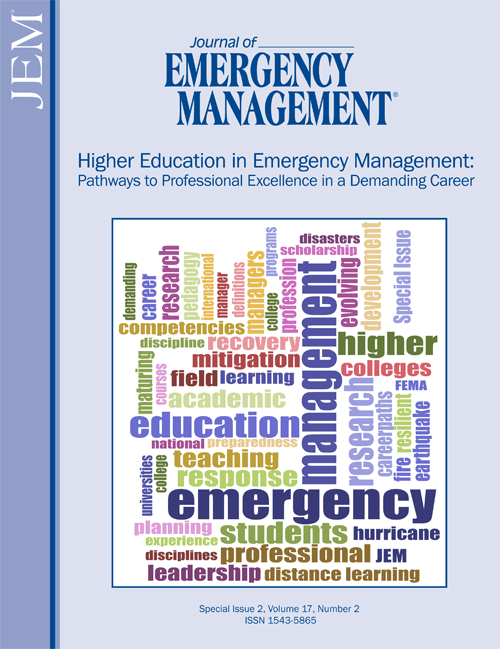Professionalization of emergency management: Are we our own worst enemy?
DOI:
https://doi.org/10.5055/jem.2019.0405Keywords:
emergency management, professional development, profession, higher educationAbstract
INTRODUCTION
By nearly every measure available, the emergency management field is growing and will continue to grow. The US Bureau of Labor and Statistics indicates that emergency management director positions will continue to grow by 6 percent through 2024.1 Given the increase in both the frequency and severity of disasters of all types, this is not surprising. As the field of emergency management has evolved and grown through the post-9/11 years there has been a push toward professionalization, and recognition of emergency management as its own unique field, rather than merely an extension of the police and/or fire service.
The status of progress toward recognizing emergency management as a profession depends on what definition we accept for what makes a profession. Arguments have been made that emergency management is not yet accepted as a profession because the field lacks some of the key features of a profession such as board certification, or a specialized body of knowledge to name a few (Canton, 2013)2. The growth of higher education, the International Association of Emergency Managers’ Certified Emergency Manager designation, as well as state-level certifications certainly speak to progress toward different aspects of achieving this goal. However, we still have a long way to go.
Graduate-level emergency management education remains discipline-specific; many graduate programs offer emergency management as a track or concentration within a broader program (eg, public policy, public health, law, etc) Emergency management lacks standardized education that provides required minimum skill sets and competencies. Furthermore, education, while preferred, is not a requirement for employment in most jobs in the field, even at the senior executive level. Even as we move toward getting ourselves recognized as a profession, however, we insist on portraying ourselves to the world as first responders in our advertising of higher education programs, and even in our own doctrine. By misrepresenting ourselves, intentionally or not, we are doing a disservice to the next generation of emergency managers. We are taking a step back from becoming a unique and independent profession.
References
Bureau of Labor Statistics, U.S. Department of Labor: Occupational Outlook Handbook, 2016-2017 Edition, Emergency Management Directors. Available at https://www.bls.gov/ooh/management/emergency-management-directors.htm. Accessed February 3, 2017.
Canton Lucien: Is Emergency Management a Profession? 2013. Retrieved from http://www.govtech.com/em/emergency-blogs/managing-crisis/Is-Emergency-Management-a-Profession.html.
Farris D, McCreight R: The professionalization of emergency management in institutions of higher education. J Homeland Secur Emerg Manage. 2014; 11(1): 73-94.
Published
How to Cite
Issue
Section
License
Copyright 2007-2025, Weston Medical Publishing, LLC and Journal of Emergency Management. All Rights Reserved.






